Trophy Hunting Namibia
As the second-lowest population density on the planet, Namibia is known for being one of the safest countries in Africa. After gaining independence in 1990, the country has enjoyed stability for over thirty years. Namibia’s sparse population, ultimate hunting experiences, and truly rugged and wild landscape are perfect for rifle and bow hunting, make for an incredible adventure, and ensure an exceptional trophy quality experience.
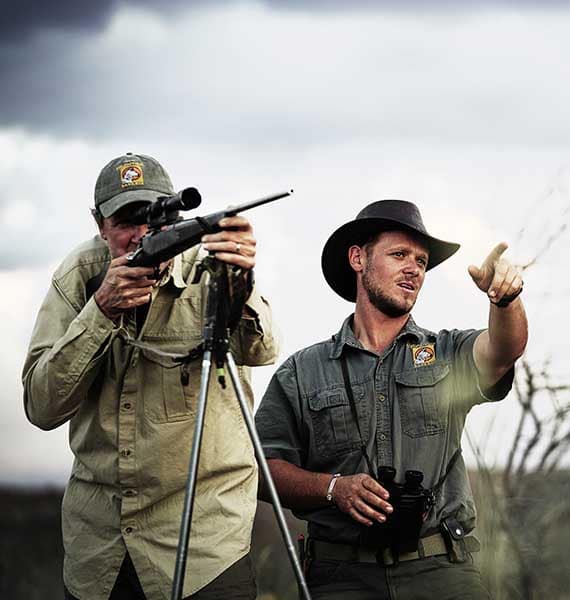
African Hunting Safaris
Take a step back in time to local hunting as Ruark experienced. Each client will be guided by one of our highly qualified professional hunters across our amazing privately owned, with custom hunting rights, off-the-grid, 30,000 acre wilderness concession. Pass through the thorny lowlands and into the Mopane forested mountains where exceptional trophy quality eland and kudu in Africa can be found.
If bows are your passion, the thick bush and mountainous terrain in the Etosha Conservancy lends itself to a successful archery experience. Each of the 10 waterholes has a ground blind and a couple of tree stands, giving the archer a great opportunity to hunt trophies for the books.
Take a step back in time to local hunting as Ruark experienced. Each client will be guided by one of our highly qualified professional hunters across our amazing privately owned, with custom hunting rights, off-the-grid, 30,000 acre wilderness concession. Pass through the thorny lowlands and into the Mopane forested mountains where exceptional trophy quality eland and kudu in Africa can be found.
If bows are your passion, the thick bush and mountainous terrain in the Etosha Conservancy lends itself to a successful archery experience. Each of the 10 waterholes has a ground blind and a couple of tree stands, giving the archer a great opportunity to hunt trophies for the books.

Meet The Owners
Burchell – Wolf Hunting Safaris takes its name from its owners Scot Burchell and Katie Wolf. This young couple will make your experience one to cherish.
What Guests Say About Our Trophy Hunting Experience – Testimonials

Bob Paro
★★★★★
“I know trying to decide on a place to go hunting in Africa can be difficult. Having hunted the Burchell’s Trudia farm in Northern Namibia, I can tell you that it is a great lodge. The terrain has a rugged beauty with lots of great animals. 40-inch gemsbok and 50-inch kudu are all possible. The living arrangement is simple, with tented chalets that remind one of the days gone by with modern amenities. The Boma is the center of it all, with great authentic African meals being served. Scot and Katie are gracious hosts who will instantly make you feel welcome, and you will leave feeling like family. Everyone works to make your stay as comfortable as possible. Do not hesitate to book if you get the chance.”

Jeff Smith
★★★★★
“Hi, I’m Jeff Smith I’m from Hernando Mississippi, and my first and second hunting safaris were with Scot Burchell and his family. Hunting with them is the best experience I’ve ever had. Excellent accommodations, great food, and the friendliest staff you will ever meet. Their properties are huge and beautiful. Bird life is just something you have to experience. Never a dull moment. We saw numerous remarkable animals and their trophy care is second to none. I cannot stress enough how important it is to have people care about your experience as much as you do. You will arrive as a client and leave as lifetime friends. Thank you, Scot, for all my memories. I will cherish our friendship forever.”
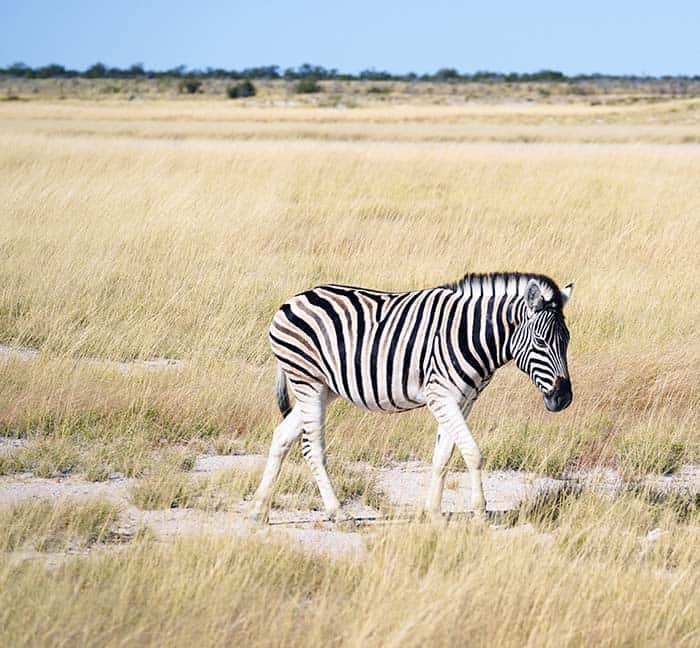
Exclusive Hunting Rights
Hunting Namibia offers a diverse selection of hunting trophies. At Burchell-Wolf, you will find only the indigenous wildlife of the northern part of the state. Mountain Zebra, Burchell Zebra, and oryx roam the rolling hills. Klipspringers can be found sunning on a rocky outcrop in the early mornings. It is not uncommon to see a Damara dik dik or two coming in for an afternoon drink at one of our many watering holes.
Hunting Namibia offers a diverse selection of hunting trophies. At Burchell-Wolf, you will find only the indigenous animals of the northern part of the state. Mountain Zebra, Burchell Zebra, and oryx roam the rolling hills. Klipspringers can be found sunning on a rocky outcrop in the early mornings. It is not uncommon to see a Damara dik dik or two coming in for an afternoon drink at one of our many watering holes.

Top African Hunting Safari in Namibia
One of the main focuses at Burchell-Wolf is your trophy. You will have a chance at world-class animals in the Etosha Conservancy, including 55″ kudu and bigger. In addition, the largest Cape Eland and Livingston Eland are also found roaming the Etosha Conservancy’s mountains.
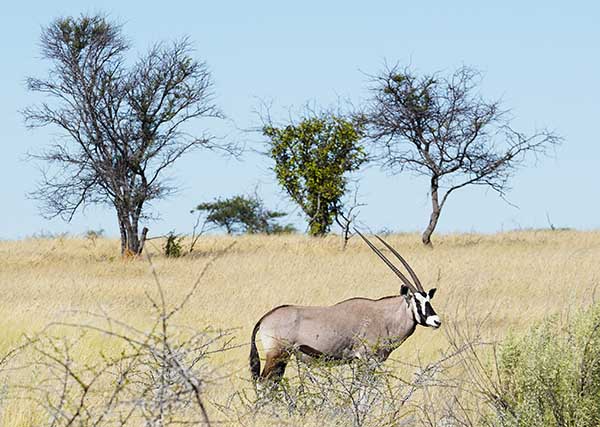
1×1 Plains Game Hunting Namibia
Family-owned and operated, Burchell-Wolf can give personal attention to each client who walks into camp. Unless otherwise requested, all clients are paired with their professional hunter to provide the best exceptional personal service. Observers are always welcome to tag along and take in the aspects of your hunting safaris up close and personal. All hunting takes place between 1 Mar-31 Oct.
Hunting Methods
With Burchell-Wolf, each hunting safari in Namibia is adapted to provide a choice and variety of safari hunting methods depending on the clients’ capabilities. The most common and successful method is the classic spot and stalk with your gun in hand. With a bow, sitting silently at a watering hole can be rewarding.
What Hunters Need To Know
The hunting season is regulated by the Namibia professional hunting association (NAPHA). This organization ensures ethical plains game hunting safaris of the highest standard. At Burchell-Wolf, we pride ourselves on wildlife conservation and management through ethical practices. When hunters come to Burchell-Wolf hunting safaris, they will find a truly great hunting experience.
Rifle And Bowhunting Safaris
There are many opportunities for both types of hunting. With countless species to target, including four of the ten tiny antelope and the largest eland and kudu on the planet, this hunting safari is a true adventure. Although unknown to many, the area also has incredible wingshooting opportunities.
Rifle And Bowhunting Safaris
There are many opportunities for both types of hunting. With countless species to target, including four of the ten tiny antelope and the largest eland and kudu in the world, this hunting safari is a true bucket list memory maker. Although unknown to many, the area also has incredible wingshooting opportunities.
More Than Just a Hunting Lodge
The hunting lodge is the perfect destination for all, from first time hunters to seasoned pros. With over 50 square miles and located in the Etosha Conservancy, our hunting territory consists of various terrains, including an entire mountain range, bushland, and open savannahs with animals that score in the Safari Club International record book.
Our Prices
At Burchell-Wolf, we know that hunting is all about the opportunities given. This is why we don’t worry about creating packages and rather let our enthusiasts simply pay a day fee and hunt off our price list. This allows the hunter to take the opportunities presented to him/her while out in the bush. We also know the best way to keep it relevant is to introduce it to the next generation. For this reason, we offer your groups to bring children 12 and under to join in on the fun with no day/observer fee.
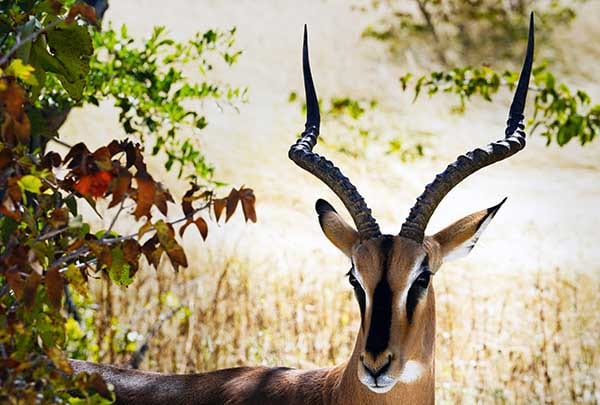
Get Started With Professional Hunters and Top Wildlife Hunting Trophies
Let us take you on a real free range hunt, unlike hunting elsewhere in Africa. With truly rugged Namibia hunting and a vast number of species, come and experience the real, wild Africa.
